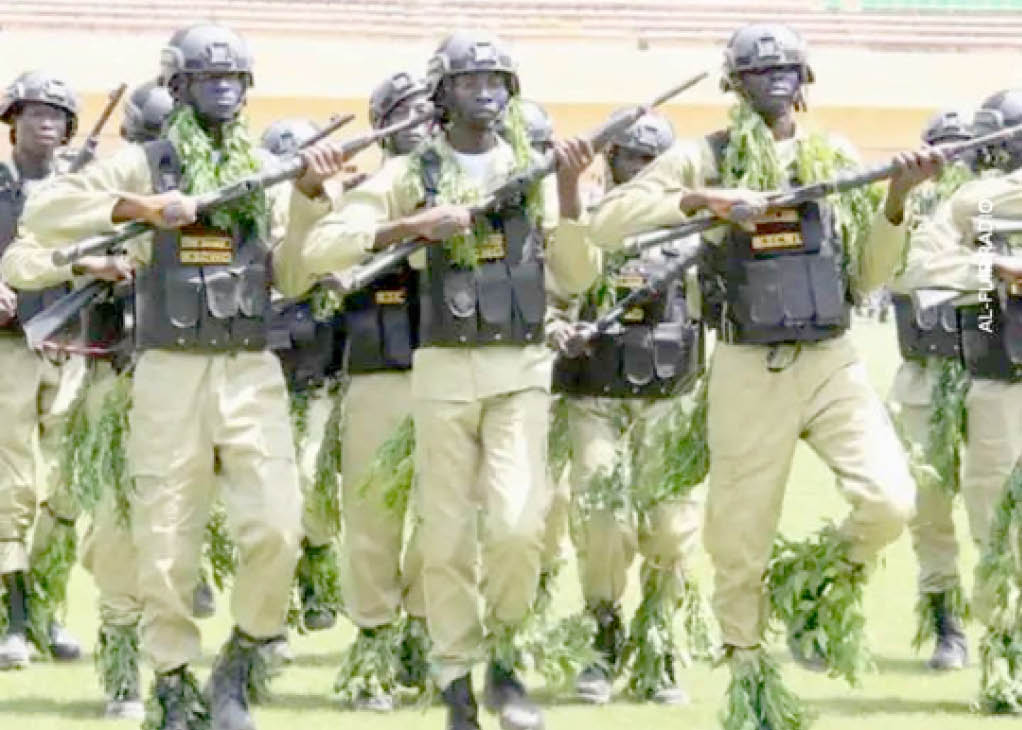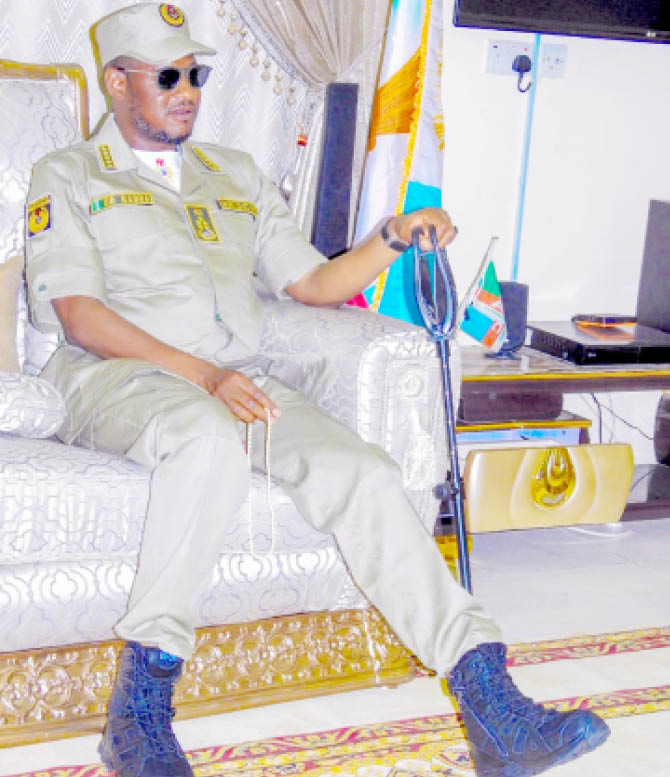High expectations, concerns greet launch of Katsina’s Community Watch Corps
As part of its continued efforts towards addressing problems of insecurity bedeviling Katsina State, the state government on Tuesday launched its Community Watch Corps, with the sole aim of augmenting the efforts of the conventional security agencies operating in the state, fighting banditry and other forms of criminalities. In a show of solidarity and support, […]

Some members of the corps during the passing out parade in Katsina
As part of its continued efforts towards addressing problems of insecurity bedeviling Katsina State, the state government on Tuesday launched its Community Watch Corps, with the sole aim of augmenting the efforts of the conventional security agencies operating in the state, fighting banditry and other forms of criminalities.
In a show of solidarity and support, former President Muhammadu Buhari and governors from the northwest states and that of Yobe attended the graduation and passing out parade of members of the new security outfit which was done amidst elaborate fanfare.
Close to 1,500 young men and women were drawn from across the state, particularly the frontline local government areas, in order to take part in security operations having known their terrain better than the security agents in most cases.
During the event, Governor Radda also inaugurated a security intervention trust fund committee under the Secretary to the State Government, Alhaji Abdullahi Garba Faskari, with a three-week mandate to submit its report on how to mobilize and suggest how to expend funds on security, among other terms of reference.
Customers groan over high cost of yam in Niger
Meet Gambo Haruna, Kano widow pushing wheelbarrow to feed 6 children
In his address at the event, Governor Radda said security was a top priority of his administration as 22 out of the 34 LGAs in the state were severely affected by insecurity, hence the training and equipping of the community watch corps serves as an “emblem of our commitment to security, peace, and community-cantered advancement.”
“During the course of my campaign, I was able to transverse across the 361 wards in Katsina State and witnessed the devastating effects of insecurity on our communities. People have been denigrated to poor living conditions, immense psychological trauma, and a complete demolition of socioeconomic development.
“In line with my campaign promises, security has been the topmost priority for my administration and we have invested vast resources to ensure sustainability in our fight against banditry. This should come as no surprise to anyone as 22 out of 34 local governments in Katsina face severe security challenges,” he said.
In his remarks, the Chairman of the KCWC Maj. Gen. Junaidu Sani Bindawa (Rtd), expressed confidence that the insecurity bedevilling the state and the northwest region could be mitigated through that kind of arrangement and done in other climes.
He said the young men and women were trained in weapons handling, counter terrorism, first-aid, civil-military relations and other security related activities in order to assist the security agents in mitigating the security challenges in their various.

Structure and mode of operation
In an interview with Daily Trust Saturday, the Katsina State Commissioner for Internal Security and Home Affairs, Dr Nasir Babangida Mu’azu, said the Corps had the requisite legal backing as a bill seeking to establish it was transmitted by the state governor to the state assembly, which debated and unanimously passed it into law which was subsequently assented to by the governor.
“All these were done within two weeks. The state assembly fast-tracked the process because of the importance of the community watch corps, taking into cognizance, the insecurity in the state in which we were left with no option than to have this kind of the establishment,” he said.
Dr Mu’azu said the corps members have gone through two-months of intensive and rigorous training by experts in order to bring them up to the task ahead of them.
In terms of structure, the commissioner said the corps has a well-structured command and control arrangement with a committee comprising representatives from all security agencies at the head of the establishment.
“This highest committee comprises of representatives of all the security agencies – the army, Police, Civil Defence and what have you – and it is chaired by a retired major general, Junaidu Bindawa.
He said the highest committee reports to his ministry, which is the supervising organ while the ministry reports to the governor, who is the grand commander as far as the outfit is concerned.
“Secondly, we have a state commander, the deputy commander and assistant commander who are in charge of command and control at the state level. Then at the local government level, we have the divisional commanders who will superintend the activities of the corps, just like the police DPO. We also have the 2iCs operation and administration and then the operatives of the corps,” he explained.
Talking about the kind of weapons the new security outfit will be handling, Dr Mu’azu said it was going to operate within the purview of the law, leveraging only on what the law has provided for in addressing issues of insecurity, saying “we will not do anything prohibited by the law.”
In terms of their remuneration and other welfare packages, the commissioner said the government has provided for allowances all across the structure, saying the recruits will begin as casual employees until such a time when they would pass their probation period. He added however, that they will not go below the minimum wage of N30,000.
Communities express high expectation, offer suggestions
Some members of the communities that spoke with Daily Trust Saturday on the development expressed high expectations and offered some suggestions.
Chairman of Jibia Peoples Forum, Alhaji Dahiru Gide, commended the Katsina State government, saying “This is a right step forward and a very good effort by the Governor Radda administration.
“Right from the intention and the objectives, we can say it is a giant step forward towards curtailing and addressing this problem that has spoilt the whole livelihood of our people.
“However, this noble objective can only be achieved without the cooperation of the conventional security agents, like the army and the police on the one hand and then the affected communities on the other hand.
“I would also like to advise that amongst these new outfit, there should be trained persons who will be helping in intelligence gathering in order to counter the problem of intelligence sharing with the criminals by informants within the communities,” he added.
On his part, Sadiq Abubakar, a resident of Faskari, said residents were hopeful that the issue of insecurity will be considerably reduced with the introduction of the security watch corps.
“This is because most of those engaged were already members of vigilante, who are privy to the happenings in the affected communities and they have the passion and the desire to protect their communities.
“I personally know some of them that were either kidnapped or members of their families were kidnapped and they were involved in ransom payment. So, this training and the light weapons they will be given with definitely encourage them to put in their best,” Abubakar said.
He however expressed concern that the number engaged was inadequate considering the number and arms of the bandits, hoping that the government will increase the number of the corps members to meet the challenge.
Security expert expresses concern
In addition to some concerns raised by observers as to how the trained young men could conduct themselves in the face of bandits’ attacks, Dr Bashir Kurfi, said “First of all, it is alright you mobilize communities to make an effort in the security that affect their lives, for the simple reason that you don’t have enough police and other security operatives, but it is equally important to be very careful in taking these people you train to handle arms and other tactical techniques without corresponding mechanism to monitor their activities. This is because you don’t have guarantee that later they will not become some warlords or even join the bandits.
“Also, their training should not only be the physical or military one per se, but it should also be ideological so that they will feel they have a commitment for the protection of their people not just for material gain.
“Another serious issue is the guns which they bought, that is costly in the market. If you give it to them, what do you think will happen if they find themselves in need of some finances to take care of their family issues? So, what mechanism do you have in place to ensure that the arms are always in the right hands and right place?’ he queried.
Dr Kurfi also expressed concern over the corps members confronting highly sophisticated armed criminals.
He suggested that there should be a national guideline from the office of the national security adviser that regulates those kinds of activities for any state that would want to have its own security outfit.
“The state governments should also look for experts’ advice and consider the security of their people as most important rather than what they will realize through contracts and procurements of the weaponry and other gadgets,” he advised.
